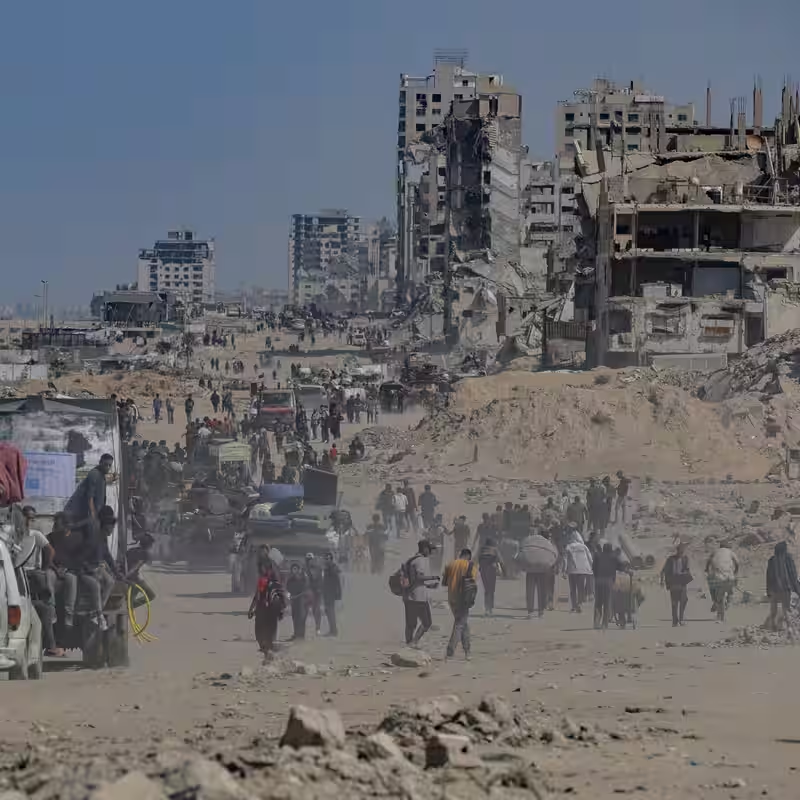Table of Contents
- A Ceasefire Without Joy
- Two Years of War, 67,000 Lives Lost
- Hostages Freed, Prisoners Released—At What Cost?
- From Firewood Bread to 600 Aid Trucks a Day
- Hamas Reasserts Control Amid Fragile Peace
- Trump’s Surprising Take on Hamas Policing
- Sources
Gaza Ceasefire Holds—But for Many Palestinians, There’s Nothing to Celebrate
The bombs have stopped falling in Gaza. Hostages have returned home. Palestinian prisoners have walked free. On paper, the Gaza ceasefire marks a turning point after two brutal years of war.
Yet on the ground, amid mountains of rubble and shattered lives, relief is tinged with despair. “It’s important that the bombing has stopped,” said Saed Abu Aita, a displaced father from Jabaliya, “but there’s nothing to be happy about.”
His two daughters are dead. His home is gone. A shrapnel fragment remains lodged in his ribs—untreated for over a year due to the collapse of Gaza’s health system.
Two Years of War, 67,000 Lives Lost
Israel’s military campaign, launched after Hamas’s October 7, 2023 attack that killed 1,200 Israelis and took 250 hostages, has claimed more than 67,000 Palestinian lives, according to local health officials. Thousands were children. Entire neighborhoods have been erased.
Now, with the guns silent, survivors face a new battle: rebuilding in a land with no electricity, clean water, or functioning hospitals.
Hostages Freed, Prisoners Released—At What Cost?
The ceasefire deal, brokered by the U.S., Qatar, Turkey, and Egypt, secured the release of the last 20 living Israeli hostages in exchange for nearly 2,000 Palestinian prisoners.
For Hamas, this was a core war aim. But many Gazans question whether the human cost—mass graves, generational trauma, and near-total societal collapse—was worth it.
“They needed to go home a long time ago,” Abu Aita said of the hostages. “Holding them gave Israel a pretext to keep bombing.”
From Firewood Bread to 600 Aid Trucks a Day
Under the agreement, Israel has committed to allowing 600 aid trucks daily into Gaza and reopening the Rafah crossing with Egypt. For the first time since March, cooking gas is flowing again.
“For two years, we’ve dreamed of this moment,” said Amani Nasir, 30. “We’ve had enough of tents, fire, displacement and thirst.”
The World Food Program now supports 17 bakeries across central and southern Gaza. “Today is better than yesterday,” said Abdel Nasser al-Ajrami of Gaza’s Bakers’ Union. “Tomorrow will hopefully be better.”
Hamas Reasserts Control Amid Fragile Peace
Despite the ceasefire, Hamas has not disarmed. In recent days, its internal security forces have reappeared at intersections, and clashes with rival armed groups have erupted in Gaza City.
Abdullah Shehab, 32, described being stopped by masked gunmen he believed were Hamas operatives. “The situation is very fragile,” he warned. “The weak party hasn’t been convinced to accept the strong party’s demands.”
Israel insists the war cannot end until Hamas’s military and governing structures are dismantled—a condition Hamas has not accepted.
Trump’s Surprising Take on Hamas Policing
During a visit to Israel coinciding with the hostage release, President Donald Trump was asked about Hamas acting as a de facto police force.
“They’ve been open about it, and we gave them approval for a period of time,” Trump said, suggesting the U.S. temporarily tolerates Hamas’s role to “stop the problems.”
His broader vision includes training a new Palestinian police force—but that plan hinges on Hamas eventually stepping aside, a prospect that remains uncertain.
For now, Gaza’s ceasefire offers breathing room—but not peace, not justice, and certainly not celebration.
Sources
The New York Times: Gazans See Little to Celebrate Even Though the Bombs Have Stopped




